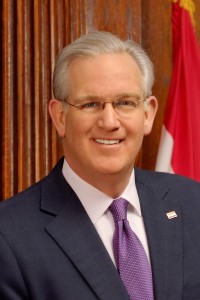ST. LOUIS — Gov. Jay Nixon vetoed Senate Bill 29, the so-called “paycheck protection” bill by supporters and “paycheck deception” bill by opponents, Thursday afternoon, which came as little to no surprise to those who have followed the issue.

The bill would require public employees to provide written consent before union dues could be taken out of their paycheck as well as separate written consent for dues to be used for political purposes. Nixon, in his veto letter, said the legislation targets a single group of employees, imposing “an unnecessary and cumbersome process.”
The bill’s support in the Senate fell directly along party lines with a 24-10 vote, but in the House the count is significantly below the 109 votes needed for a veto-proof majority with an 85-69 final vote.
Rep. Eric Burlison, R-Springfield, who handled SB 29 in the lower chamber and sponsored a separate version of the bill, House Bill 64, told The Missouri Times that he wasn’t surprised by the veto, adding that he thinks Nixon “acted in his own self interest because he receives money from unions.”
Burlison pointed out that the Senate Bill included the language regarding the written consent for union dues on an annual basis that the House Bill didn’t.
“My bill was much more universal and directed toward First Amendment rights,” he said, referring to the aspect of consent for dues being used for political purposes.
HB 64 received a 90-65 vote on the third read in the House in mid March before it ultimately died in the Senate while the upper chamber’s version came through.

Several of the Republican representatives who voted in favor of the House version of the bill switched to “no” votes on the Senate version, including Reps. Jay Barnes, Paul Curtman, Jim Hansen, Dave Hinson and Caleb Rowden.
- Final House vote on HB 64 (photo)
- Final House vote on SB 29 (photo)
For Curtman, R-Pacific, the Senate bill “created more red tape” than he said he was comfortable with. He said it’s one issue to require written authorization and another to write the contract for employees, which was a line the Senate version crossed that the House bill didn’t, he said.
“I’m a conservative and of course I don’t like red tape,” Curtman said. “I know right now a union member, if they want to exempt themselves, they can currently do that, and so I had some problems there.”
Nixon included the existing statute in his veto letter that allows public employees to elect whether to have union dues withheld, which currently requires a one-time authorization that can be revoked any time, according to the letter.
“Employees are not required to take additional steps to cause such withholdings to continue in subsequent years,” Nixon wrote. “But under this bill, public employees who are members of unions would be required to complete two separate written authorizations each year.”
Shortly after the veto announcement, groups like AFL-CIO, AFSCME and Progress Missouri spoke out via social media and press releases in support of Nixon’s actions. Other organizations, like the Missouri Chamber of Commerce, spoke against the action.
Ashley Jost is no longer with The Missouri Times. She worked as the executive editor for several months, and a reporter before that.






